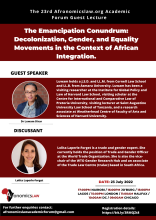Book Review I of The African Continental Free Trade Area Agreement: The Development of a Rules-Based Trading Order - The Problem of Protectionism in Africa
This paper explores the persistence of protectionist trade policies across Africa and their implications for economic development, regional integration, and the African Continental Free Trade Area (AfCFTA). While protectionism can support emerging industries and strategic sectors, excessive reliance on it undermines long-term growth and regional cooperation. Kofi Oteng Kufuor’s work on protectionism in Africa, as a sub-part of his recent monograph The African Continental Free Trade Area Agreement: the Development of a Rules-Based Trading Order, dissects the problem of protectionism within Africa. He demonstrates the threat to the planned single market from a range of forces, that can operate on two-levels, the sub-regional level and the regional level. African countries have stunted intra-African trade with protectionism. Drawing from historical developments, legal frameworks, and policy case studies—including Nigeria’s 2019–2020 border closure—the study evaluates the balance between national trade protection and continental liberalization efforts. It also highlights institutional and regulatory constraints that hinder AfCFTA’s implementation. The paper concludes by advocating for a pragmatic approach to trade policy—combining time-bound protectionism with structural reforms to foster sustainable development and pan-African economic unity.

